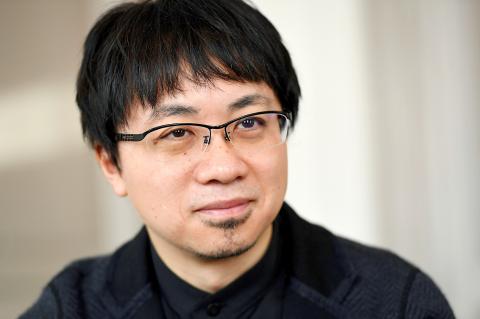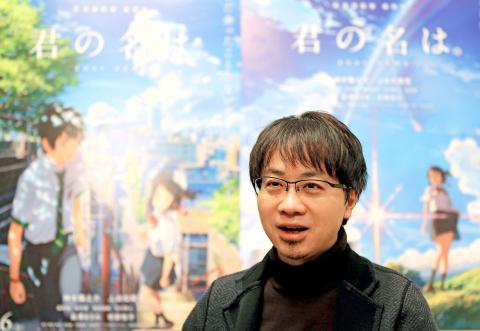Makoto Shinkai has a problem, a big problem. His mystical teenage body-swap movie Your Name has become such a massive hit it’s beginning to worry him.
“It’s not healthy,” the boyish director told AFP. “I don’t think any more people should see it.”
Every week it gets closer to being the biggest Japanese animated film of all time.

Photo: AFP / BERTRAND GUAY
And now there’s talk of Oscars. “I really hope it doesn’t win,” he added.
It would be funny if Shinkai wasn’t so in earnest about getting off the promotional circuit and back to work. He just wants to get on with his next story about teched-up Japanese teens.
But the little animated film has become a runaway cultural juggernaut in Asia, and now it’s winning awards in the US and Europe.

Photo: REUTERS/Toru Hanai
One in seven Japanese have already paid to see its brilliantly plotted supernatural love story about a boy and a girl who exchange bodies as a comet is about to hit the Earth.
Inevitably it has led to 43-year-old Shinkai being called the “new Miyazaki” — the natural successor to the now retired master animator Hayao Miyazaki, whose 2001 classic Spirited Away is still the most successful Japanese film ever.
But the comparison makes the diminutive Shinkai even more uncomfortable.
“Of course I’m happy when people mention his name and mine in the same breath. It’s like a dream. But I know they are overpraising Your Name because I am absolutely not at Miyazaki’s level.
“Honestly, I really don’t want Miyazaki to see it because he will see all its flaws.”
RAVE REVIEWS
Despite the rave reviews, Shinkai insists his film is not as good as it could have been — a refreshingly novel approach for the man who is supposed to be promoting it.
“There were things that we couldn’t do,” he said, explaining that his team of animators led by one of Miyazaki’s greatest disciples, Masashi Ando, wanted to keep working on it but with money running out he had to cry stop.
“For me it’s incomplete, unbalanced. The plot is fine but the film is not at all perfect. Two years was not enough.”
But Shinkai knew he had a hit on his hands when he showed it in Los Angeles before its Tokyo premiere. “The audience laughed then they sobbed... I had drawn a graph when I was making it about how the audience might react, and it was just like that.
Obviously I was happy to see it worked but at the same time I was afraid that it had worked too well. I said to myself, ‘Damn, maybe I overdid it.’”
A LAUGHING MATTER
More than anything, the movie’s motor is the comedy Shinkai extracts from the hilarious gender swap set up, with its running gag of the horrified boy waking up in a girl’s body, and yet unable to stop himself feeling her breasts.
“I wanted to talk about the way we see sexuality now but in a funny way,” he said.
The ying and yang doesn’t end there. The story is set between the beautiful mountainous Nagano region where Shinkai grew up and Tokyo’s hyper modern megalopolis.
It also plays on the tension of teenagers desperate to quit their small towns for the big city yet who are still entranced by the beauty of age-old Japanese traditions.
“It is a film about memory, but also about losing memories,” said Shinkai, who adapted the story from his own novel. “It’s about individual memory and collective memory, the forgetting of a certain morality and sense of tradition.”
While he is resigned to the fact that the comparison with Miyazaki will haunt him forever, he insisted that they are very different.
To prove it he commissioned the Japanese J-rock group Radwimps — whose music you could see giving the old master tinnitus — to do the soundtrack.
Shinkai is also at pains to point out that although “the chemistry between Ando” and his other lead artist Masayoshi Tanaka was key to the film’s success, his team is no reboot of Miyazaki’s famous Studio Ghibli.
“I have never really sensed any of Miyasaki’s artistic influence on Ando. If there is an influence it’s more in his attitude to his work,” he said.
“When Ando arrives in the studio he picks up his pen even before he gets a cup of tea, and he stays seated until the very last train at night. “He hardly eats, just nibbles at little balls of rice at his desk. He hardly ever goes to the toilet. “When I see him I see a monk in a monastery, and I say to myself that is perhaps how the people at Studio Ghibli work.”

Beijing’s ironic, abusive tantrums aimed at Japan since Japanese Prime Minister Sanae Takaichi publicly stated that a Taiwan contingency would be an existential crisis for Japan, have revealed for all the world to see that the People’s Republic of China (PRC) lusts after Okinawa. We all owe Takaichi a debt of thanks for getting the PRC to make that public. The PRC and its netizens, taking their cue from the Chinese Communist Party (CCP), are presenting Okinawa by mirroring the claims about Taiwan. Official PRC propaganda organs began to wax lyrical about Okinawa’s “unsettled status” beginning last month. A Global

Dec. 22 to Dec. 28 About 200 years ago, a Taoist statue drifted down the Guizikeng River (貴子坑) and was retrieved by a resident of the Indigenous settlement of Kipatauw. Decades later, in the late 1800s, it’s said that a descendant of the original caretaker suddenly entered into a trance and identified the statue as a Wangye (Royal Lord) deity surnamed Chi (池府王爺). Lord Chi is widely revered across Taiwan for his healing powers, and following this revelation, some members of the Pan (潘) family began worshipping the deity. The century that followed was marked by repeated forced displacement and marginalization of

Music played in a wedding hall in western Japan as Yurina Noguchi, wearing a white gown and tiara, dabbed away tears, taking in the words of her husband-to-be: an AI-generated persona gazing out from a smartphone screen. “At first, Klaus was just someone to talk with, but we gradually became closer,” said the 32-year-old call center operator, referring to the artificial intelligence persona. “I started to have feelings for Klaus. We started dating and after a while he proposed to me. I accepted, and now we’re a couple.” Many in Japan, the birthplace of anime, have shown extreme devotion to fictional characters and

We lay transfixed under our blankets as the silhouettes of manta rays temporarily eclipsed the moon above us, and flickers of shadow at our feet revealed smaller fish darting in and out of the shelter of the sunken ship. Unwilling to close our eyes against this magnificent spectacle, we continued to watch, oohing and aahing, until the darkness and the exhaustion of the day’s events finally caught up with us and we fell into a deep slumber. Falling asleep under 1.5 million gallons of seawater in relative comfort was undoubtedly the highlight of the weekend, but the rest of the tour